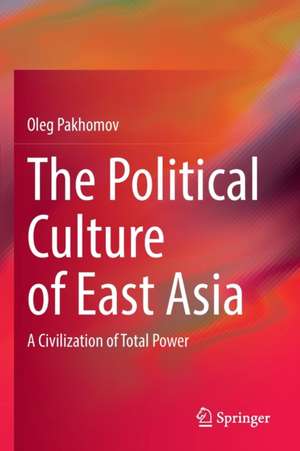The Political Culture of East Asia: A Civilization of Total Power
Autor Oleg Pakhomoven Limba Engleză Paperback – 17 mar 2023
| Toate formatele și edițiile | Preț | Express |
|---|---|---|
| Paperback (1) | 621.96 lei 17-24 zile | +54.20 lei 7-13 zile |
| Springer Nature Singapore – 17 mar 2023 | 621.96 lei 17-24 zile | +54.20 lei 7-13 zile |
| Hardback (1) | 725.50 lei 6-8 săpt. | |
| Springer Nature Singapore – 16 mar 2022 | 725.50 lei 6-8 săpt. |
Preț: 621.96 lei
Preț vechi: 818.37 lei
-24% Nou
Puncte Express: 933
Preț estimativ în valută:
119.01€ • 124.26$ • 98.50£
119.01€ • 124.26$ • 98.50£
Carte disponibilă
Livrare economică 10-17 martie
Livrare express 28 februarie-06 martie pentru 64.19 lei
Preluare comenzi: 021 569.72.76
Specificații
ISBN-13: 9789811907807
ISBN-10: 9811907803
Pagini: 129
Ilustrații: X, 129 p. 1 illus.
Dimensiuni: 155 x 235 mm
Greutate: 0.22 kg
Ediția:1st ed. 2022
Editura: Springer Nature Singapore
Colecția Springer
Locul publicării:Singapore, Singapore
ISBN-10: 9811907803
Pagini: 129
Ilustrații: X, 129 p. 1 illus.
Dimensiuni: 155 x 235 mm
Greutate: 0.22 kg
Ediția:1st ed. 2022
Editura: Springer Nature Singapore
Colecția Springer
Locul publicării:Singapore, Singapore
Cuprins
Chapter 1. Formation of East Asian Complex of Total Power A.East Asian Complex of Total
Power during Traditional Period B.Total Power in China C.Adaptation of Total Power in
Korea D.Adaptation of Total Power in Japan E.Total Power and the Problem of Regional
Order.- Chapter 2. Modernization of East Asian Complex of Total Power.- Chapter 3. Japanese Empire: Modernized Total Power.- Chapter 4. Total Power and East Asian Nation-States during Cold War.- Chapter 5. East Asian Tradition of Total Power and Neoliberal Globalization.
Notă biografică
Oleg Pakhomov is an associate professor in the Arctic Studies Center at Liaocheng University, China. He received his Ph.D. from Kyoto University's Graduate School of Human and Environmental Studies in social anthropology where he won a Japanese Government Monbukagakusho: MEXT Scholarship. He began his career as a public servant in the International Department of Primorsky Territory Government of the Russian Federation, where he implemented programs of regional development and cooperation with governments as well as foreign investors from the Asia-Pacific region. He was then the chairperson of the Department of History and Archaeology at Far Eastern Federal University, where he developed new legal and educational frameworks to strengthen scientific and educational cooperation with universities in China, South Korea, and Japan. He later served as an international relations advisor to the President of Kazan Federal University in Russia, establishing cooperation with universitiesin the East Asian region. In this role, he successfully implemented a number of joint scientific and educational projects with universities in China, South Korea, and Japan in different subject areas, including chemistry, physics, engineering and in social science disciplines. His research interests include comparative politics with a focus on the East Asian region—China, North/South Korea, Japan, and Russia. He is currently working on a project that develops the ideas of Karl Wittfogel on the tradition of total power during the contemporary period in relation to the political culture of East Asia.
Textul de pe ultima copertă
This book explores the phenomenon of total power in East Asia, with particular attention to China, Korea, and Japan. It shows how total power enables an examination of regional experience as a part of global context in order to demarcate the connections with other countries and regions that have similar political cultures, such as those in Central Asia, the Middle East, and East Africa. Moreover, it elucidates that the phenomenon of total power unpacks the interrelations not only between different countries, but also between political, economic, religious, or cultural aspects of the region as a whole, and of each country in particular. This book takes East Asia as a classic example of where total power has achieved the highest forms of development during traditional periods in the form of absolute economic dependence of society on the state, ideologically enshrined by a system of moral obligations toward supreme power that allowed for the establishment of a monopoly on forced labour, and the appropriation and distribution of social products. The author emphasizes the importance of exploring the tradition of total power with reference to the ongoing global crisis of European democracy. In doing so, the book shows that democratization has not brought qualitative changes to the political culture of East Asia. An essential interdisciplinary read for scholars studying political science, particularly East-West relations, this book situates East Asian political culture within a global context.
Caracteristici
Provides an interdisciplinary outlook on East Asia's political culture within a global context Presents an in-depth analysis of the shared historical tradition of total power Considers the impact of historical setting on contemporary political culture
